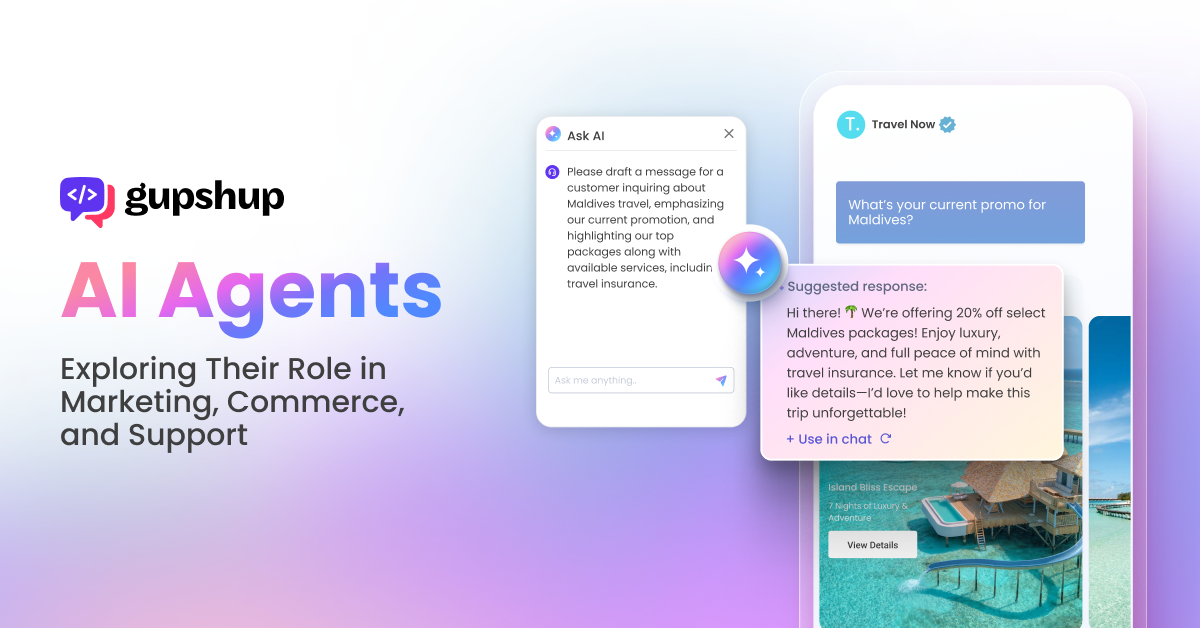What Are AI Agents? Exploring Their Role in Marketing, Commerce, and Support

In today’s digital world, where technology evolves at an unprecedented rate, businesses are constantly seeking innovative ways to engage with their customers, streamline operations, and optimize services. At the forefront of this technological revolution are AI Agents, often powered by conversational AI, which are transforming the landscape of marketing, commerce, and customer support.
What are AI Agents?
AI Agents are software programs equipped with artificial intelligence capabilities designed to autonomously perform tasks by understanding and processing human language. They can engage in conversations, provide information, and assist with various customer interactions, mimicking the cognitive functions of human agents. Powered by Large Language Models, AI Agents can analyze vast datasets, learn from interactions, and enhance their responses over time.
How do AI Agents work?
AI agents are designed to perform tasks with a level of autonomy, mimicking certain aspects of human decision-making and problem-solving capabilities. At the core of these agents is their ability to perceive their environment, reason about the current state, and take actions that help them achieve specific goals. This autonomy is typically achieved through a combination of advanced algorithms, machine learning models, and sometimes reinforcement learning that allows the AI to improve its performance over time based on feedback. These agents assess complex situations, weigh potential actions, and make decisions aimed at optimizing certain outcomes. Their development is underpinned by extensive data, sophisticated computational models, and a layered architecture enabling dynamic interaction with both users and systems.
The functioning of AI Agents often involves several interconnected components. Perception mechanisms allow these agents to collect and interpret data from their environment, whether it be textual input in a chatbot conversation or sensory data in robotics applications. Knowledge representation plays a crucial role, enabling the AI to store, retrieve, and utilize information about the world. Decision-making algorithms form the crux of an agentic AI’s ability to evaluate different courses of action, which is particularly enhanced by the use of techniques like neural networks and decision trees. These systems can simulate numerous potential scenarios and choose the one that aligns best with pre-defined objectives, all while adjusting to changes in real-time or through iterative learning processes.
Furthermore, AI agents are designed with adaptability in mind, allowing them to respond to new, unforeseen challenges. This adaptability is often achieved through continuous learning frameworks that refine the agent’s model based on new input and experiences. For instance, in a customer service chatbot, agentic capabilities might enable the system to handle novel queries or personalize interactions based on past customer behavior without pre-programmed scripts. This learning can be unsupervised, supervised, or a hybrid, leveraging big data and analytic tools to discern patterns and make informed decisions. The ultimate goal is to create AI that not only executes tasks but does so with a level of sophistication that emulates human initiative, creativity, and context awareness. Despite their enhanced capabilities, integrating these agents ethically and ensuring their alignment with human values remains a critical consideration in their development and deployment.
What makes AI Agents different & powerful?
AI agents are distinct in the realm of artificial intelligence due to their advanced capabilities, setting them apart by reason, memory, and action. These agents are designed to autonomously work towards specific goals using sophisticated reasoning and orchestration mechanisms. Unlike simple rule-based systems, AI agents possess the capacity to process large amounts of data and make dynamic decisions. This allows them to interact in a manner that is both empathetic and adaptive, akin to human interactions. As a result, AI agents can understand context, gauge user emotions, and tailor their responses in a way that enhances user experience and achieves desired outcomes efficiently.
Memory is another fundamental aspect that makes AI agents stand out. They are equipped with both long-term and short-term memory systems, enabling them to retain information from past interactions and apply this knowledge in the present. This memory capability ensures that AI agents can offer personalized experiences by recalling user preferences and past interactions. It further allows them to identify the shortest path to resolution for any given issue, minimizing effort and time for users. Such a sophisticated memory framework empowers AI agents to continually learn and improve their ability to assist users effectively, creating a seamless and intelligent interaction experience.
In addition to their reasoning and memory capabilities, AI agents are differentiated by their ability to execute actions effectively. They can select from a variety of tools and methodologies to carry out their tasks, whether it’s retrieving information, performing diagnostics, or processing transactions. This capability enables them to handle complex tasks that may otherwise require human intervention. By autonomously handling multifaceted processes and decision pathways, AI agents increase efficiency and productivity across various applications, from customer service to technical support. Ultimately, it is their ability to reason, remember, and act that distinguishes AI agents, allowing them to perform at levels that closely resemble human intelligence, but with the efficiency and consistency that only machines can provide.
AI Agents in Marketing
In the realm of marketing, AI Agents are transforming how brands connect with their audiences, offering personalized, real-time engagement strategies that resonate with individual customers.
1. Personalized Customer Journeys
AI Agents can analyze customer behavior, preferences, and purchase history to deliver hyper-targeted marketing messages. By customizing outreach based on unique customer data, they create personalized customer journeys that enhance engagement and conversion rates. Whether it’s sending tailored product recommendations or crafting content that aligns with user interests, AI Agents ensure marketing strategies are both effective and individualized.
2. Enhancing Customer Experience
AI Agents enhance the overall customer experience by offering instant responses and support. They can engage customers through conversational interfaces on websites, apps, and social media, answering queries, providing product information, and guiding users through purchase decisions. This immediate, personalized service fosters customer satisfaction and loyalty.
3. Automating Campaign Management
AI Agents are increasingly used to automate marketing campaign management. They can set up and manage advertising campaigns by targeting specific demographics based on real-time analytics, optimizing ad spend, and reporting performance metrics. This level of automation frees up resources, allowing marketing teams to focus on strategic initiatives.
AI Agents in Commerce
In the commercial sector, AI Agents streamline operations and enhance customer interactions, driving efficiency and sales growth.
1. Interactive Shopping Assistants
AI Agents serve as interactive shopping assistants on e-commerce platforms, guiding customers through products, providing detailed information, and suggesting complementary items. This personalized shopping experience not only improves customer satisfaction but also increases the likelihood of conversions by simplifying the buying process.
2. Inventory Management and Order Processing
AI Agents can manage inventory by predicting demand trends based on historical data, ensuring businesses maintain optimal stock levels. They can also automate order processing and fulfillment, reducing human error and improving operational efficiency. This seamless integration of AI in commerce allows businesses to respond rapidly to market demands.
3. Customer Feedback and Insights
AI Agents can collect and analyze customer feedback, providing valuable insights into consumer behavior and preferences. By understanding customer sentiment, businesses can make informed decisions to enhance product offerings, refine customer service, and develop targeted marketing strategies.
AI Agents in Customer Support
AI Agents revolutionize customer support by providing scalable, 24/7 assistance, and significantly improving response times.
1. Automated Help Desks
AI Agents function as automated help desks, resolving basic inquiries, troubleshooting common issues, and escalating complex cases to human agents when necessary. This capability ensures that customer support remains consistent and efficient, even during high-demand periods.
2. Multilingual Automated Support
AI Agents break language barriers in customer service by offering multilingual support, enabling businesses to cater to diverse customer bases globally. They can interpret and respond in various languages, enhancing the accessibility of customer support services.
3. Predictive Customer Service
AI Agents can predict potential customer issues by analyzing interaction patterns and historical data. This foresight allows businesses to proactively address concerns before they escalate, leading to improved customer satisfaction and reduced churn rates.
The Future of AI Agents
As AI agents become more autonomous, providing them with the appropriate guardrails becomes imperative to ensure their safe and effective operation. The increased freedom and decision-making ability AI agents possess, while beneficial, also bring the risk of unintended consequences. One of the foremost concerns is avoiding harmful content. AI agents must be equipped with robust filtering mechanisms to prevent the dissemination of offensive or dangerous material, ensuring that their interactions remain appropriate and beneficial to users. Implementing these safeguards involves leveraging advanced algorithms and training data that help identify and neutralize potential threats before they impact users.
Moreover, AI agents must be vigilant in avoiding ungrounded content, such as misinformation or unverifiable claims. As AI systems are often deployed in environments where accuracy is paramount, maintaining a high standard of information integrity is crucial. Ensuring that AI agents can discern between credible and non-credible sources is essential to maintaining user trust and delivering reliable service. Additionally, AI agents need to be designed to respect copyright laws and intellectual property rights, avoiding unauthorized use or reproduction of protected material. This responsibility involves embedding algorithms that can recognize and manage content subject to copyright, aligning AI operations with legal standards and ethical considerations.
Guardrails also play a crucial role in preventing jailbreaks and manipulation of AI systems. As these agents become more sophisticated, the potential for exploitation by malicious actors increases. Reinforcing AI with robust cybersecurity measures and countermeasures against manipulation ensures their operational integrity and protects user data. This involves a hybrid approach where AI agents operate alongside structured, NLP-based bots. Integrating structured bots provides a transitional framework that helps bridge the gap between traditional scripted systems and fully autonomous AI agents, ensuring stability and predictability while AI systems evolve.
Looking to the future, multi-agent collaboration represents a natural progression in AI development. By enabling multiple AI agents to work in tandem, leveraging each other’s strengths and specialized capabilities, the AI ecosystem can become more adept at handling complex, multifaceted tasks. This collaborative approach not only enhances the overall efficiency of AI operations but also facilitates a more cohesive and adaptive AI environment, capable of achieving objectives that a single agent might struggle with. By implementing these comprehensive guardrails and facilitating collaboration, we can harness the vast potential of AI agents while maintaining the safety and security of users and systems alike.
Conclusion
AI Agents, powered by Agentic AI, are not just a technological trend but a transformative force reshaping the business landscape. By enabling personalized marketing, streamlining commerce operations, and enhancing customer support, these intelligent tools are invaluable assets in any business’s digital arsenal.
As we look toward the future, embracing AI Agents will be critical for businesses looking to remain competitive, engage with customers authentically, and lead in innovation. With their ability to deliver human-like interactions at scale, AI Agents are paving the way for smarter, more connected business strategies that meet the demands of today’s digital age.
Frequently Asked Questions (FAQ’s)
1. What are AI agents?
2. How do AI agents work?
3. What are the types of AI agents?
- Reactive agents: Respond to specific inputs without memory.
- Goal-based agents: Act based on desired outcomes.
- Utility-based agents: Prioritize actions based on probabilities and rewards.
- Learning agents: Improve performance over time through learning and experience.
4. How are AI agents different from chatbots?
5. What industries benefit the most from AI agents?
- Customer support (automating responses, reducing resolution time)
- E-commerce (personalized recommendations, order tracking)
- Healthcare (virtual assistants, patient monitoring)
- Finance (fraud detection, automated trading)
- HR & recruitment (resume screening, interview scheduling)
6. Can AI agents integrate with existing business systems?
7. How do AI agents improve customer experience?
Discover how AI agents can accelerate your business growth with these resources:
- Calculating ROI with AI Agents: Maximize Efficiency & Growth
- From “There’s an App for That” to “There’s an AI Agent for That”
- How AI Agents Are Transforming Business Marketing
- Deep Dive: How AI Agents Personalize the Online Shopping Experience
- Transforming Marketing Outcomes: The Rise of Conversational AI Agents






